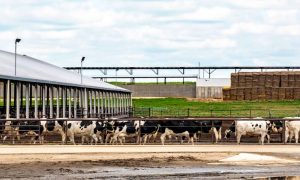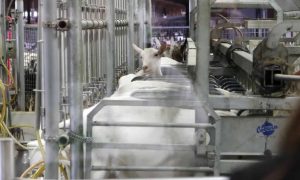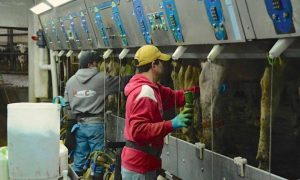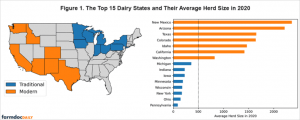
Just in the last decade, the Canons — Mark and Marie, the fourth generation on the West Middlesex, Pennsylvania farm, and their son and daughter, Trent and Josie — have added a creamery, solar panels and robotic milkers, and continue to try new things and keep equipment updated. They say those types of decisions have helped them stick around through tough times for the dairy industry.
“We’ve always had a good herd of cows,” said Mark Canon. Marie agreed, but added that comes from good management and staying up-to-date on the farm.
“We stay current … When you keep it current, I think it’s more attractive to the generation coming up,” she said.
Family
After graduating from Pennsylvania State University in 2014, Trent worked off the farm for about three years in agronomy and soil sampling. He got frustrated with some of the farmers he worked with who didn’t want to try new things. And he found himself comparing what other farms were doing to his own family farm.
“I got a family farm at home … nobody else is trying anything; I’m going to go try something,” he said. Now, he leads the farm’s crop operation.
Josie decided to come back to the farm after serving as the 2016-2017 Mercer County Dairy Princess.
“It just got me thinking about the industry,” she said. “You just meet a whole bunch of farmers.”
At that point, dairy was also going through a rough time. She wanted to help make sure her family farm had a future.
The farm used to bottle milk back in the 1930s and 1940s, and Mark was interested in doing something like that again. Josie enjoyed making cheese and liked the idea of starting a creamery. So, she went back to school at a local community college, after taking a year off, and got a degree in business management to learn enough to get started.

Transition
The generational transition has been going smoothly so far. The time off the farm gave Trent a lot to bring back with him. He saw farms using all sorts of systems, across multiple counties.
“I brought some new ideas back, and dad … he was very open to implementing them,” Trent said. He’s also been able to continue learning from Mark, especially on the dairy side — Trent considers himself more of a “field work guy” than a “cow guy.”
Marie also thinks it helps that their children didn’t feel like they had to come home. Marie and Mark have five children, and so far, two of them have decided to come back to the family business.
They regularly have family dinners and meetings, not just with Trent and Josie, but with their spouses as well. That way, everyone affected knows what’s going on with the farm. That open communication, including talking about everything from money to possible changes on the farm, has been a big help, Josie said.
“We already had a good family dynamic,” she added.
Mark and Marie credit that dynamic and smooth transition partly to seeing a healthy farm transition modeled by Mark’s parents. Mark’s dad started to step back from the farm when Mark was 40. By the time he was 45, he and his dad still had a partnership, but Mark owned the larger percentage of the farm and was the one mostly running it. The more sweat equity he put into the farm, the more ownership he earned.
“When you sit down at any farm gathering, and if you listen very closely for very long, you hear ‘Grandma still keeps the books’ … or ‘Grandpa won’t let us change anything in the barn,’” Marie said. “I married into a family that that was all handled openly, beautifully, from the beginning.”

Conservation
The dairy, which milks about 115 cows and raises forages and other crops to help feed the cattle, recently received a FARM Excellence Award in environmental stewardship, from The National Dairy Farmers Assuring Responsible Management program.
The Canons have used cover crops and no till for a long time, but have more recently added in multiple species of cover crops and rye crimping, which involves letting rye grow in the spring and rolling it down to plant corn into, instead of mowing it. Rye crimping helps control weeds and saves them time and money on herbicides.
“The conservation practices are just a matter of taking care of the land better, saving money,” Mark said.
They also use solar panels on the roof of the barn to supply much of the farm’s energy. The solar panels have been a good fit for the Canons because their energy needs are the greatest in the summer, when they have to run fans to keep the cows comfortable, which is also when the panels are producing the most energy. Trent has taken the lead on a lot of the farm’s conservation practices.
“I want the ground to be more profitable for the next generation, and the next generation should learn from that and make it more profitable for their next generation,” Trent said. “The only way to keep farming is to have sustainable land, and profitable land.”
While many of the family’s conservation practices are connected to the grain and cattle, they also extend to the creamery. Energy from the solar panels also powers the creamery, and the Canons reuse glass bottles and recycle water used for heating and cooling milk to water the cows.
“There’s always things we can do to be more efficient,” Josie said.
Future
The farm’s next steps are growing the creamery and adding more acres for crops, Mark said. Currently, most of the farm’s milk goes to a cheese plant in Wilmington. Eventually, the Canons plan to use about 25% of the milk in the creamery.
“We just want to make sure that if there’s ever a downswing again, we’ve got an outlet for our milk,” Josie said. “And just that we have a more secure future.”
Canon Dairy already raises all of its own forages, and some of the grain for its cattle feed, but Trent wants to grow 100% of the farm’s grain within the next decade or so. They’re planning to add some grain storage on the farm. They also want to keep minimizing the amount of herbicides, fertilizer and other inputs they need to buy by using practices like cover crops.
“If you’re going to be successful as a young farmer, you’ve got to have an open mind and always be learning something new. If you’re close-minded, you’re never going to go anywhere,” Trent said.

























